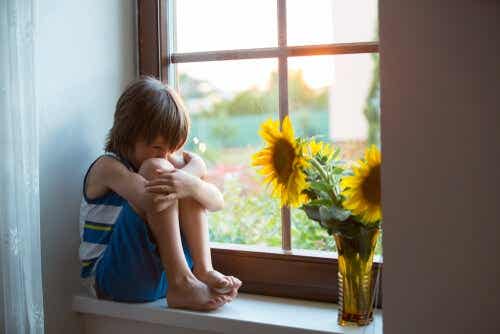Do we really know the consequences that certain dynamics have on children? How does family violence affect children?

Last update: February 06, 2022
Beyond the conflict situations between the spouses, numerous fears and doubts can affect the family unit with direct and indirect repercussions on the children. But do we really know the consequences this situation can have on children? How does family violence affect children?
Child abuse
Violence in the family, psychological or physical, is sometimes disguised under the guise of education, with the aim of undermining the child's will and making him an obedient and docile being.
In these cases, children are unable to react, being underneath the dictatorship of silence due to the authority of adults.
Psychological abuse directed at children manifests itself through verbal violence, contemptuous behavior, emotional rejection, uncompromising upbringing, and demands that are disproportionate to the child's age.
This form of family violence, which is never harmless, it can be exercised indirectly or directly.
The shadows of indirect family violence
Family violence affects children even when it occurs between parents. The attacking parent uses verbal (contempt, total disqualification, insults, lies, etc.) and non-verbal means of communication (grimaces, gestures, etc.), as well as physical destruction of objects, violent behavior such as beatings, magnification of past events, etc.
Children also become victims, because they are present and because they somehow refuse to distance themselves from the attacked parent.
They are witnesses of the conflict, they receive all the evil that comes from the situation. The children thus begin to isolate themselves, losing the ability to identify, to which is added the figure of the attacked parent who was unable to react to the aggression, and the reproach of one parent on the other.
Isolation in childhood
Isolation can have serious consequences for the child, because if he doesn't find a way to deal with it himself, he will bring himself on the shoulders a load of suffering which will play in other places, with other people and in other situations.
Over time, the attacking parent transmits hatred towards the partner even towards the children, behavior completely unacceptable for any reason.
Ambiguous situations experienced by the child can lead to its self-destruction due to uncertainty and moments of confusion. The malicious behavior, full of hatred and bad intentions of the attacking parent, introduces him into a dead end spiral in which he seeks and desires the recognition of the parent who rejects him.
This is unlikely to happen, hence the child interiorize a negative self-image accepting it as deserved. Thus, the attacking parent has in his hands a live and manipulable subject, who can undergo a large number of humiliations.
How to prevent indirect family violence
For a parent who engages in psychological violence, it is unacceptable to see their children happy or successful. Manipulating children is easy through emotional blackmail, as they tolerate limitlessly, they excuse the people they love and are always ready to forgive their parents, take the blame and try to understand them.
For children there violence in the family is a very difficult situation, since they are under the orders of only one parent, while the other, the one who is perpetually attacked, can rarely help them except with a listening full of suffering.
The situation can also worsen when the non-attacking parent walks away and leaves the child alone to face the other's contempt. Perhaps we see this situation as far from reality, the truth is that it is more frequent than we think.
In light of this, it is advisable to review habits and behaviors from time to time, with the aim of changing them if necessary. Violence is not just that exercised through slaps, but also through humiliation, criticism and contempt.


























